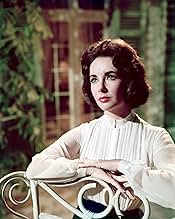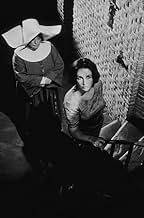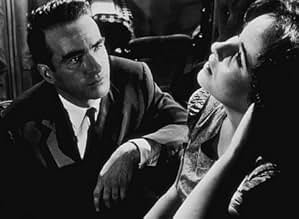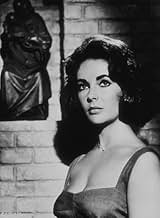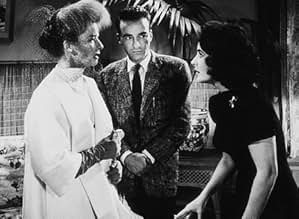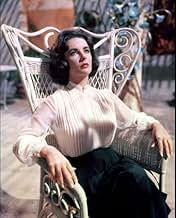Le fils unique de la riche veuve Violet Venable meurt alors qu'il est en vacances avec sa cousine Catherine. Ce que la jeune fille a vu était si horrible qu'elle en est devenue folle? à prés... Tout lireLe fils unique de la riche veuve Violet Venable meurt alors qu'il est en vacances avec sa cousine Catherine. Ce que la jeune fille a vu était si horrible qu'elle en est devenue folle? à présent, Mme Venable veut que Catherine soit lobotomisée pour découvrir la vérité.Le fils unique de la riche veuve Violet Venable meurt alors qu'il est en vacances avec sa cousine Catherine. Ce que la jeune fille a vu était si horrible qu'elle en est devenue folle? à présent, Mme Venable veut que Catherine soit lobotomisée pour découvrir la vérité.
- Réalisation
- Scénario
- Casting principal
- Nommé pour 3 Oscars
- 4 victoires et 7 nominations au total
- Dr. Hockstader's Secretary
- (as Sheila Robbins)
- Asylum Inmate
- (non crédité)
- Asylum patient
- (non crédité)
- Nurse
- (non crédité)
- Street Urchin
- (non crédité)
- Inmate
- (non crédité)
- Nurse
- (non crédité)
Avis à la une
With relatively few characters to populate the story the performances are absolutely crucial, and the tight-knit cast delivers the goods in spades. Long after many of her acting contemporaries of the thirties and forties had been forgotten, Katharine Hepburn continued to reign supreme on the silver screen and her sublime performance as the manipulative and cunning Mrs. Venable ranks among Hepburn's best work of the decade. The wounded vulnerability of a post-car accident Montgomery Clift serves him well in a difficult role as the middle man between the film's leading ladies, and the still-handsome actor provides a humane, completely genuine performance that supplies viewers with level-headed window into the off-kilter story. Albert Dekker, Mercedes McCambridge and Gary Raymond also excel in minor roles.
The film's biggest surprise, however, is the exceptional portrayal of Elizabeth Taylor in the film's central performance. Although usually somewhat of an uneven actress, Taylor completely nails a dauntingly difficult role in a complex, multilayered performance that deservedly won her a Golden Globe Award as well as her third consecutive Oscar nomination. During the film's climatic revelation, Taylor lets out a series of bone-chilling screams that I could never imagine coming out of any other actress. Not only does it remain Taylor's finest performance (which is a considerable achievement when one considers that WHO'S AFRAID OF VIRGINIA WOOLF is also on her resume), but it is also a performance that simply could not be bettered.
Although perhaps he could never surpass 1949's A LETTER TO THREE WIVES or 1950's ALL ABOUT EVE in the eyes of most viewers, SUMMER contains some of the finest work of director Joseph L. Mankiewicz' legendary career. Brilliantly combining southern Gothicism with straight-faced psychodrama and even grandiose horror, Mankiewicz stitches the various seemingly disparate threads together in a harrowing, yet perversely satisfying whole. Even the lengthy, sometimes criticized flashback sequence is an absolute tour de force of film-making that leaves viewers emotionally exhausted as one experiences the on screen turmoil more than simply watching it. An often unheralded classic, the film remains of the most sorely underrated films of its era.
This leaves MONTGOMERY CLIFT, as a surgeon who is asked to perform a lobotomy on Miss Taylor, hovering in the background and looking like a frightened sparrow most of the time, although it is he who uncovers the truth about last summer. Mr. Clift must have been at a difficult phase of his own personal life because he performs in a stiff, robot-like manner that makes him seem dubious as a skilled surgeon with steady hands.
All of this is highly melodramatic as only Tennessee Williams can muster, while at the same time affording us the luxury of watching two commanding performances from Hepburn and Taylor that were justifiably nominated for Oscars.
The tale seems burdened by too much heavy-handed poetry but somehow it holds the attention because of the forceful acting by a fine cast. Mercedes McCambridge is a standout as Taylor's mother in the sort of fluttery, birdbrain role one might suspect would be offered to Billie Burke if this had been filmed in the 1940s.
By the end of the film, Miss Hepburn is so far removed from reality that she thinks Dr. Sugar (Montgomery Clift) is her son Sebastian and seems more like a candidate for lobotomy than the plucky Miss Taylor. Taylor never quite has the air of vulnerability that the role demands, but she gives a colorful, if strident, performance as the poor victimized girl who was used as bait by her playboy cousin.
The Mankiewicz script is very talky. The characters of both Hepburn and Taylor engage in lengthy and at times tedious monologues. In all that talking, at least there are some really good lines. My favorite is near the beginning. In a nonchalant tone, Mrs. Venable tells us about the daily vicissitudes of Lady, the Venus flytrap that Mrs. Venable keeps in her garden. "Lady must be kept under glass, and while she is under glass, we have to provide her with flies, flown in at great expense." Priceless.
As one would expect for a film derived from a stage play, cinematography and music are less important than dialogue and acting. "Suddenly Last Summer" is worth viewing for its unusual story, and for the acting accomplishments of Hepburn and Taylor.
This is a film that would never be made today - it's character-driven and has too much dialogue. It's a shame because the dialogue is excellent. A previous Mankiewicz film, "All About Eve," is word-rich as well, and there the dialogue sparkles. Here it is more poetic. And, like "Eve," the great roles are the womens.
Though references to homosexuality are only inferred, this film and the much more poorly adapted "Cat on a Hot Tin Roof" hold up very well today. With homosexuality much more discussed, the role this plays in both plots is very obvious, at least to this viewer. In "Suddenly, Last Summer," Sebastian's proclivities are evident from the beginning as Mrs. Venable describes an almost husband-wife relationship with her son, claiming to the surgeon that Sebastian was "chaste" and that her relationship with him was enough for her son.
One of the comments here mentioned that "Cathy is crazy, like all Williams heroines." But in truth, Cathy like Blanche is disturbed (though Blanche may be a little closer to being nuts) and both are "put away" to shut them up - Blanche for her accusations against Stanley and Cathy because she knows how Sebastian really died.
Katharine Hepburn gives a brilliant performance as Mrs. Venable - charming but made of steel, her anger and jealousy toward her niece just barely beneath the surface. Elizabeth Taylor gives one of her best performances under the strong direction of Mankiewicz. Taylor was blessed with great beauty but alas, not a great speaking voice. However, she is nevertheless very effective, particularly in her long, harrowing monologue near the end of the film.
Clift's passive portrayal of the surgeon is problematic, and one wonders why he was cast. The opening scene in which he performs an operation had to be redone many times because of his drunkenness and codeine addiction - he was washing down the pills with brandy; his voice quavers, he is unsteady on his feet, and his eyes are glassy. He comes off a little better in the previous year's "Lonelyhearts," though in that film, he actually winces in pain when he has to sit. While Clift had the support of his fellow actors, he had none from Mankiewicz and producer Sam Spiegel. Had it not been for Elizabeth Taylor's insistence, he would have been replaced. It seems cruel (as it did to Hepburn at the time) but Mankiewicz was trying to make a movie and Spiegel wanted it to be on budget - Clift's addictions and physical problems weren't helping. He couldn't remember lines; when he finally said them, he was often inaudible; and he was always late arriving on the set. Fortunately for audiences, this wasn't his last big-budget role. Under the direction of Elia Kazan, he would do the magnificent "Wild River" and seemingly be more in control.
Despite this, "Suddenly, Last Summer" is an excellent, disturbing film, and is highly recommended. It's not Williams' best play, but it is served well in its film adaptation.
Le saviez-vous
- AnecdotesAccording to author Garson Kanin in his memoir "Tracy and Hepburn," Katharine Hepburn was reportedly so furious at the way Montgomery Clift was treated by producer Sam Spiegel and director Joseph L. Mankiewicz during filming that, after making sure that she would not be needed for retakes, she told both men off and actually spat at them (although it remains unclear just which one of the two she spat at, or if she spat at both).
- GaffesAlthough set in 1937, costumes, hairstyles and makeup worn by Dame Elizabeth Taylor are all contemporary in 1959.
- Citations
Catherine Holly: Is that what love is? Using people? And maybe that's what hate is - not being able to use people.
- ConnexionsEdited into Michael Jackson's This Is It (2009)
Meilleurs choix
Détails
- Date de sortie
- Pays d’origine
- Langue
- Aussi connu sous le nom de
- Suddenly, Last Summer
- Lieux de tournage
- Begur, Girona, Catalonia, Espagne(village and old castle scenes)
- Sociétés de production
- Voir plus de crédits d'entreprise sur IMDbPro
Box-office
- Budget
- 3 000 000 $US (estimé)
- Montant brut mondial
- 9 830 $US
- Durée1 heure 54 minutes
- Couleur
- Rapport de forme
- 1.85 : 1
Contribuer à cette page




